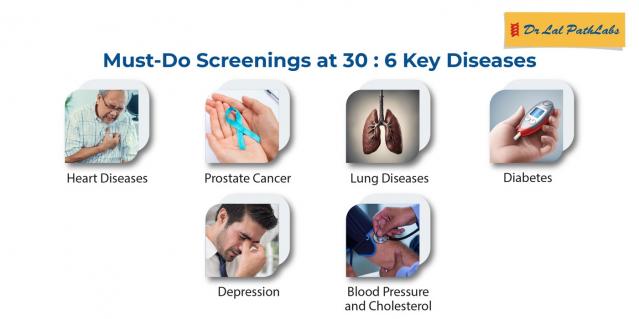Reaching the age of 30 marks a transitional period for the human body and overall health. As metabolism naturally slows, immunity weakens, activity levels decline, and stress rises, individuals become more vulnerable to various diseases. Hormonal shifts also contribute to increased Disease risk in one’s 30s.
These physiological changes signify that more proactive health screening is needed. Getting tested regularly after 30 enables early detection and treatment for potential illnesses. This article explores six common diseases that every individual must get tested for.
6 Diseases You Must Screened at the Age of 30
- Blood Pressure
High blood pressure, or hypertension, usually occurs with no obvious or noticeable symptoms. However, it puts individuals at risk for serious complications such as stroke and heart disease.
For individuals who are 30 years or older, it is recommended to get screened for hypertension every 3 to 5 years if they have no risk factors. Those with other risk factors, such as cholesterol or diabetes, need to get screened every year.
The screening process for high blood pressure is simple and is usually included with annual health screenings for adults. The test includes measuring blood pressure with a sphygmomanometer.
- Cholesterol
High cholesterol refers to a situation where there is excessive deposition of cholesterol in the blood vessels, leading to their constriction. High levels of cholesterol lead to coronary artery disease and heart disease.
People over the age of 30 are at a higher risk since the body’s ability to clear cholesterol from the body decreases. Also, since adults are more prone to leading a sedentary lifestyle, it puts them at a higher risk of developing high cholesterol.
Cholesterol screenings are recommended every two years, especially if there are other risk factors involved. Cholesterol tests are called lipid profiles, and they measure the amount of cholesterol and triglycerides in the blood. The tests check levels of both low-density lipoprotein (bad cholesterol) and high-density lipoprotein (good cholesterol).
- Diabetes
The risk of diabetes, especially type 2 diabetes increases as people age. Diabetes is a condition where the levels of glucose in the blood are elevated due to an inadequate response to insulin, a protein that breaks down sugars.
Adults over 30 who lead a sedentary lifestyle or are overweight are at a higher risk of developing diabetes. Typically, individuals should get screened for diabetes every three years. However, if they are at a higher risk, it is advisable to get screened every year.
Diabetes screening involves blood tests that check the levels of glucose in the bloodstream. There are many types of diabetes tests such as C-peptide, plasma glucose, HbA1C, and GAD Antibodies tests.
- Breast Cancer
When it comes to health screening for women over 30, tests for breast cancer are essential. Breast cancer results from the growth of abnormal cancer cells in the breast tissue. As women age, they are increasingly at risk for breast cancer. This means women should get screened regularly.
The most common screening test used to detect breast cancer is the mammogram. However, ultrasounds and breast MRIs are also used in some cases. Regular testing helps detect cancer at an early stage, making it more treatable.
- Cervical or Prostate Cancer
Women over 30 are at increased risk of cervical cancer, whereas men are at increased risk of prostate cancer. Cervical cancer is a type of cancer that affects the cervix and is usually caused by the human papillomavirus (HPV). Women should get screened regularly to detect it at earlier stages. A pap smear is a test used to determine cervical cancer. They should get their first pap smear at 30 and at intervals of 3 years following that.
Prostate cancer is a disease in which cells in the prostate grow exponentially out of control. Screening tests include the PSA test and the digital rectal examination. Men over 30 should get screened for it every two to three years. However, if they have a history of prostate cancer in their family, more regular screening is recommended.
- Cardiac Conditions
People over 30 years should get tested for cardiovascular disease or coronary artery disease. This included tests such as electrocardiogram, echocardiograms, and stress tests. These tests help identify heart conditions at early stages, facilitating easier management. It is recommended to get tested once every two years.
FAQs
1. How often should people over 30 visit the doctor?
Individuals with no health conditions should get general annual health checkups. However, thorough screenings for specific diseases are recommended every three years.
2. What are other diseases to get screened for?
People over 30 should also get screened for genetic conditions and mental health conditions, as well as liver, kidney, reproductive, and gastric conditions. These tests can ensure overall health and well-being.
3. How often should you get a pap smear after 30?
Women after 30 should get a pap smear every three years. They should also get a co-test with Pap and Human papillomavirus (HPV) tests every five years.
This post first appeared on Swine Flu – Causes, Symptoms, Treatments, Compli, please read the originial post: here

